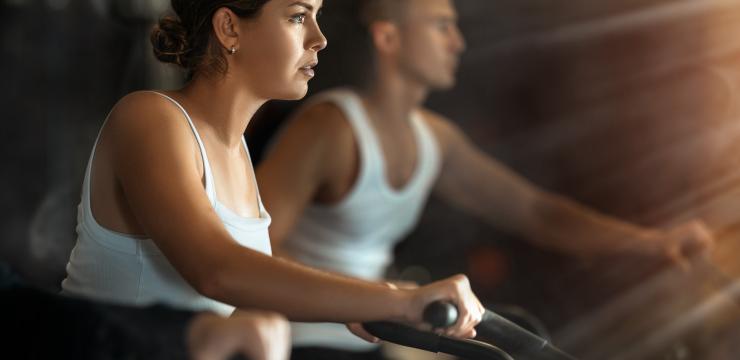
- Excerpt
When you take physical activity to heart, then let recovery be your partner. It is during the recovery phase that the body adapts to the stress imposed on it during periods of strenuous activity. Activity triggers, the body responds and it is in that response that the actual gain in condition and stamina is made. To maximize your body's recovery potential your circulatory system must be in perfect shape. For one thing, it must be able to flexibly respond to the increase of blood pressure (BP) caused by exercizing and rapidly return it to normal values. Although regular physical exercise supports longevity and long-term health, we also know that excessive increase in BP during and delayed normalization of BP right after exercise are recognized risk factors of cardiovascular disease. A recently conducted scientific study confirms that Masquelier's OPCs reduce this risk especially by enhancing the normalization of BP during the post-exercise recovery phase.
The Exercise and Recovery Study
At the "Vascular Biology" Conference held in Leuven (Belgium) from 10 to 12 September 2025, researchers working at Maastricht University and the Department of Sports Medicine of VieCuri Medical Center in Venlo (the Netherlands) presented the results of the study in which they investigated the effect of Masquelier's OPCs on the vascular system's capacity to normalize blood pressure after excercise. [I] Elevated blood pressure (BP) and abnormal circulatory responses to exercise are associated with an increased risk of cardiovascular disease. In physiological conditions, strenuous exercise increases the metabolic demand of active muscles and raises cardiac output, resulting in stepwise elevation of BP and heart rate (HR), which both return to baseline during post-exercise recovery. Delayed decline of elevated BP during the recovery period following maximal exercise represent well-established risk factors of cardiovascular mortality and acute coronary events.
Beneficial effects during recovery
"Recovery from exercise", according to this team of researchers, "is a dynamic process during which many physiological changes occur. In this study, intake of [200mg of Masquelier's OPCs during 8 weeks] was associated with a tendency towards lower Diastolic [lower value] BP at minute 2 and a significant reduction of Systolic [higher value] BP at minute 6 of the active recovery period." The reduction of BP at the onset of the recovery phase is primarily driven by the widening of the blood vessels in the veins and arteries in the arms, hands, legs and feet. These "peripheral" arteries supply oxygenated blood to the body's extremities and the "peripheral" veins lead deoxygenated blood back to the heart. Apparently, OPCs sustain the resilience and flexibility of the peripheral vascular system in recovering from exercise.
Beneficial effects during exercise
In addition, it was found that during exercise, OPCs induced a lower BP in the arteries at the lower workload, an effect that was even stronger in participants with a normal body-mass-index. Furthermore, a significant reduction in Systolic BP at a higher workload was observed in the participants showing a level of cardiovascular fitness that matched their age.These outcomes suggest that especially people with normal BMI and those with normal cardiovascular fitness benefit most from taking Masquelier's OPCs when they exercise. The researchers concluded that "supplementation with OPCs may have important implications for the reduction of cardiovascular risk in subjects with elevated BP."
Exercise generates free radicals
Regular physical exercise combined with good dietary habits is essential to maintaining good health. Indeed, athletes and those who are physically active usually have better overall health than sedentary individuals. It was found that men who engage in intensive physical activity add up to 3.8 years of a longer and healthier life, while women can add up to 3.5 years. [ii] With moderate physical exercise such as cycling, gardening or relaxed swimming one could add about 1.4 years. When training volume and intensity are increased, one not only stresses the body's circulatory system by temporarily increasing blood pressure. Another "paradox of exercise" is that it inevitably generates free radicals.
Reducing oxidative stress and injuries
Studies have shown that both strength and endurance athletes produce more free radicals than non-athletes. Free radicals have been associated with decreased physical performance, muscular fatigue, muscle damage, and overtraining. Masquelier's OPCs not only reduce the risk of cardiovascular events by assisting the circulatory system to quickly recover from the exercise-induced increase in BP. As antioxidants, OPCs also neutralize free radicals and thus reduce the risks posed by the oxidative stress involved in working out. Moreover, in case of a sports injury, OPCs shorten the healing process and thus make it possible to maintain a regular training and competition schedule.
The fundamental role of the vascular system
Lest we forget, a healthy circulatory system is especially relevant for sports persons and people who exercise because it fundamentally ensures optimal supply of nutrients to the muscles in the body. As Dr. Masquelier said: "In the human body, everything is ‘vascularized’. Each and every cell needs to be nourished and supplied with oxygen. Well, who is in charge of this nourishment and enabling every cell to breathe? Ultimately, this is a task for the capillary vessels. They are they emissaries that go to each cell!“ In this regard, Masquelier's OPCs play a key role since they specifically enhance the integrity of the capillaries. This is how they support the distribution of nutrients and oxygen throughout the body and assist as well in efficiently clearing waste products from your body.
+ + + + + + + + +
[I] Effects of monomeric and oligomeric flavanols (MOFs) on the hemodynamic response to exercise: a randomized controlled trial; Khrystyna O. Semen et al.
[ii] De Telegraaf, 30th August, 2005; news report on the doctoral research of Oscar H. Franco-Duran, Erasmus Medical Center, Rotterdam, The Netherlands).






